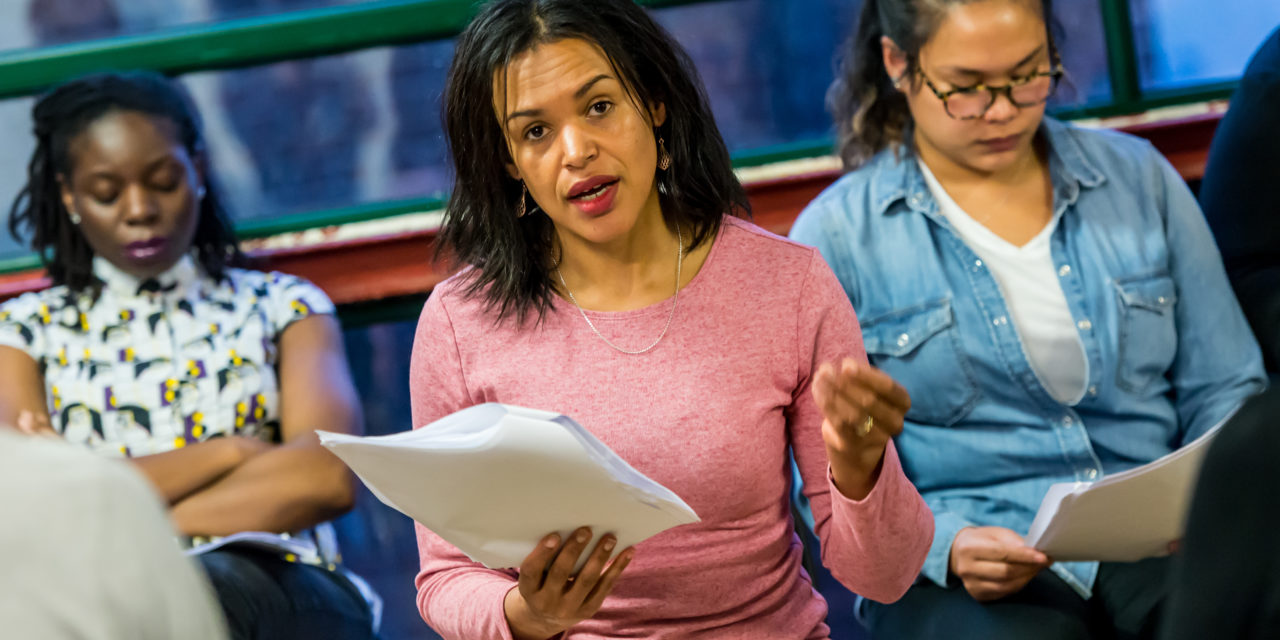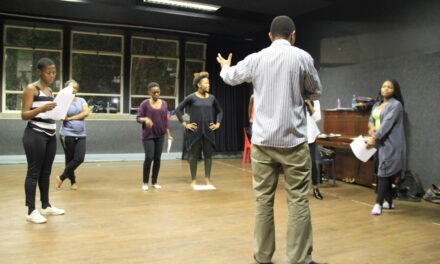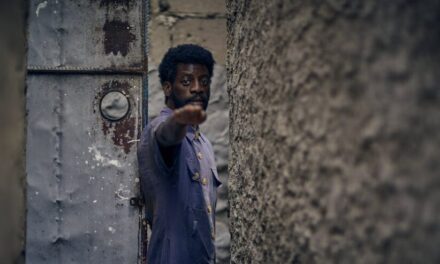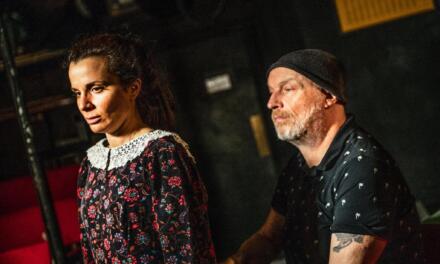In April 2018, London’s Arcola Theatre staged Global Female Voices, an evening of play readings by women writers from throughout the world. In this personal reflection, producers Lora Kristeva and Rach Skyer discuss how the project came about, the evening itself, and their plans for the future.
Life happens in the most astounding of ways. When in mid-January I put my hand up at a staff meeting to vouch my support for our Creative/Disruption festival, I had no idea of what brilliant things the next few months would hold. Working as Assistant Producer alongside Participation Manager Bec Martin-Williams and colleague Rach Skyer, we embarked on the mammoth task of coordinating five community companies, delivering 13 plays and five complementary projects over six weeks.
We began with a meeting to look at the program and make plans on how to successfully drive Creative/Disruption forward without any major casualties. Our first task was to get ready for the mini-season of Queer work by Arcola’s now legendary Queer Collective, whose 2018 season included Robert Holtom’s Cluedo Club Killings And Fine and Dandy by Sue Frumin. Part of the Queer work showcased at the beginning of our festival was Global Queer Plays, a weekend of rehearsed readings of international queer plays–an event proposed by William Gregory to give a platform to international queer playwrights. The format for Global Queer Plays was: 1) a call out for existing international plays, 2) a rigorous selection process by a panel of queer theatre-makers, 3) members of the Queer Collective and their friends directing and performing in the shortlisted plays and enjoying listening to unheard work. The project stemmed from a desire to re-balance, in our own little way, the representation of queer stories and international work in London.
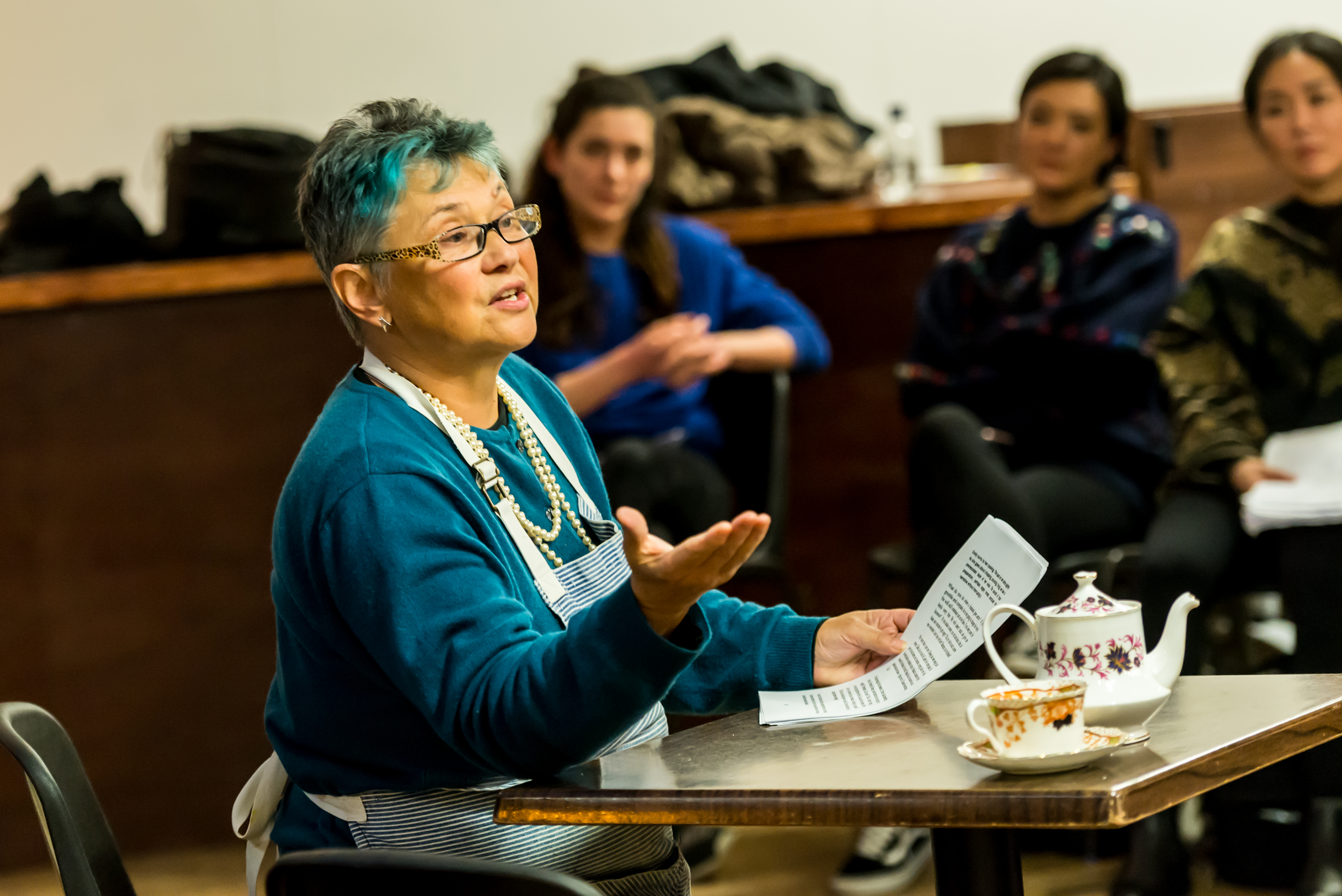
Linda Long in Emily Of Emerald Hill by Stella Kon, Global Female Voices, Arcola Theatre April 11, 2018
I had no idea that this event and its sister iteration Global Female Voices would pack Arcola’s Studio 4, and result in an ongoing relationship with publishers and an overwhelming and heart-warming demand for more. More international theatre, more unheard voices, more representation, more global voices. Little did I know I’d be putting my hand up again, pledging to develop a Global Voices brand to continue bringing exciting international theatre to the London stage.
At the time of our first planning meeting, we were not to know all of this. Thanks to the incredible foresight of Bec that we included an evening of rehearsed readings by female playwrights, following in the steps of Global Queer Plays.
The Arcola Theatre, for many years, has been championing community theatre with four amazing companies: Ala Turka, one of the only theatre companies in the UK that stages theatre for Turkish-speaking audiences (with English surtitles), Arcola 50+ which this year involved more than 35 performers in two productions, Arcola Men’s Mental Health Theatre Company which welcomes to the conversation not just men but anyone, and uses theatre as a vehicle to discuss the particular issues around Men’s Mental Health and the Arcola Queer Collective, London’s leading LGBTQ+ community theatre group. When Bec Martin-Williams joined Arcola as Creative Engagement Coordinator she rightly pointed out that there wasn’t an Arcola community company where people like her could join. Not if they did not identify as LGBTQ+ or were over 50, anyway. People like her were also still under-represented on London theatre stages: as performers, directors, and playwrights. And people like her were only 51% of the population, after all…
And it is from there that the Arcola Women’s Company (AWC) was born. Arcola received over 150 expressions of interest in 24 hours following the call-out, proving Bec’s instinct was deeply rooted in a harsh reality. In capitalist terms: there was demand!
By the beginning of December, Bec held the first ever AWC meeting. From the outset, we knew what we were signing up for: this was an intersectional space, a company open to female and intersectional identifying people; a company that, at all times, would do its best to make justice to our differences and our myriad of experiences.
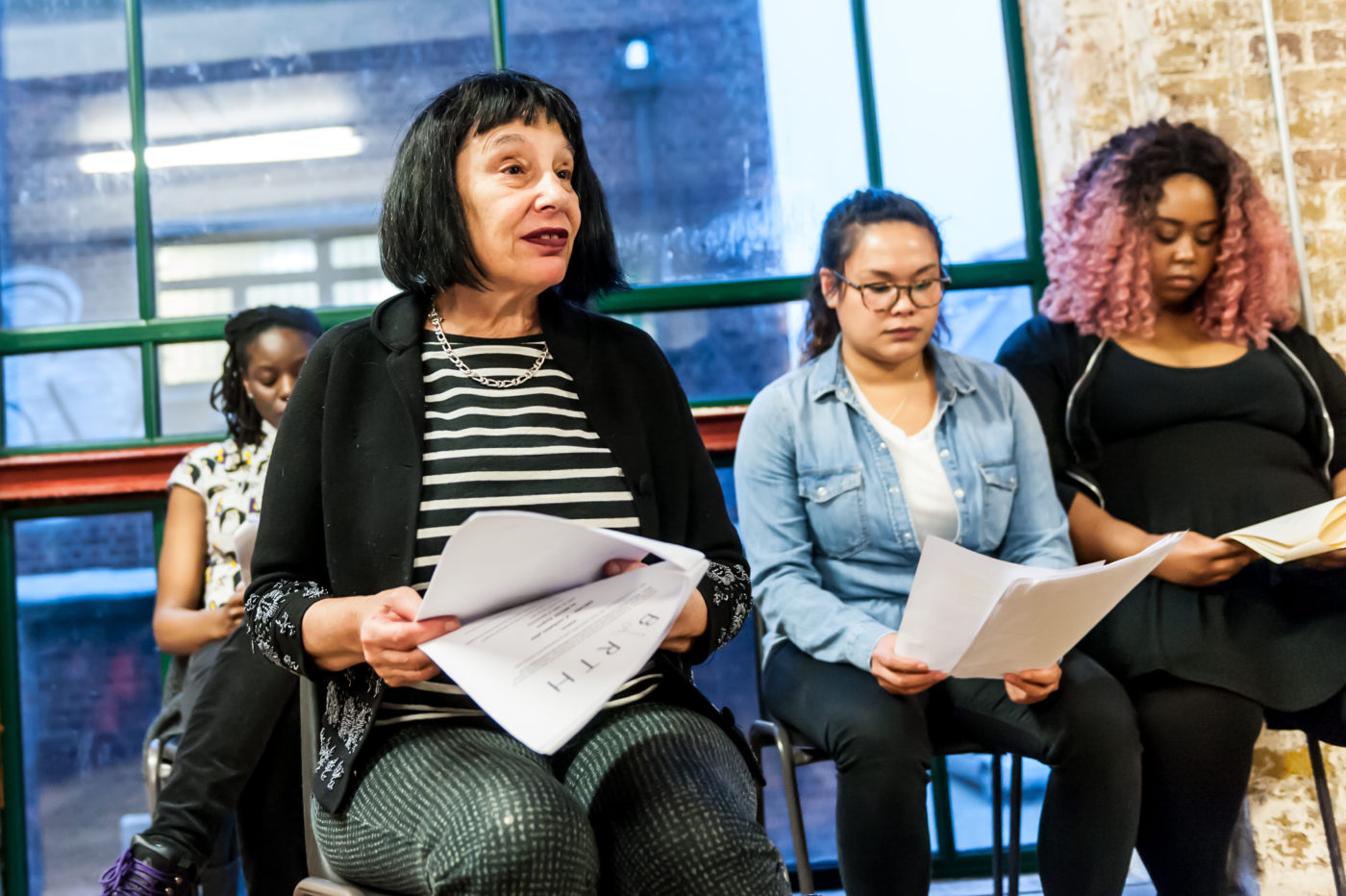
Sue Frumin in Orchid by Mũmbi Kaigwa, Global Female Voices, Arcola Theatre April 11, 2018
Bec has led us from that cold Monday evening in January to our inaugural show Smile, Darling with the same passion, commitment, and care. And I would certainly not be here telling you about Global Female Voices if it weren’t for her guidance and vision.
With the birth of AWC came the idea to showcase work from female playwrights, since we were working on a devised show and thought it complimentary to dedicate an evening to written work and female voices elsewhere. Inspired by Global Queer Plays, we took the decision to focus on international writing, in keeping with Arcola’s “locally engaged and internationally minded” ethos.
One big difference to Global Queer Plays is that we were acting very fast, adding a new event to an already very busy festival. As we definitely wanted the event to have a collaborative element from start to finish but couldn’t do an open call with the time constraints, we decided to curate it in a different way. The people in the Arcola’s Women Company who were interested in Global Female Voices met and discussed the brief. Everyone then went away to find those voices (and their English translation). What came back was–quite frankly–astonishing.
I had thought, with my very practical producer’s brain that five people co-curating an event of rehearsed readings where each one of us was looking for material would basically program itself. That is would be easy, with enough (wo)man power to find the finest female under-represented playwrights (think women of color, working class, indigenous voices). We would then have to only select the four plays that fit the format the best; the four plays that would work to be read as 20 min abstracts, that we could cast from within the AWC and their friends; the four plays that would do the title Global Female Voices justice.
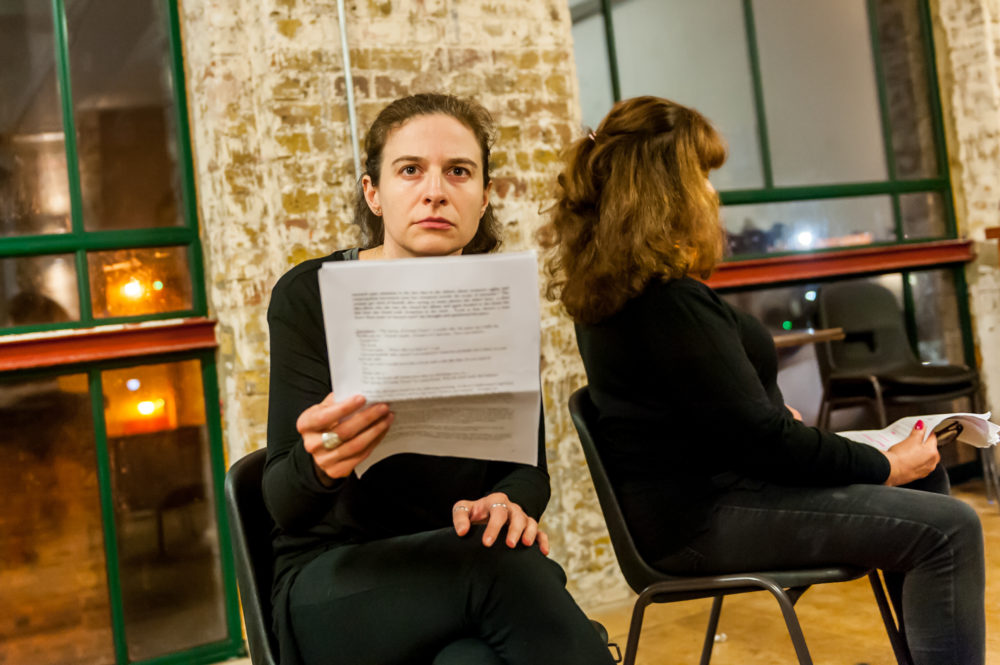
Anca Vaida in Cinderellas Ltd at Global Female Voices, Arcola Theatre April 11, 2018
It appears, however, that our task was not as easy as I thought it would be. Firstly, we encountered the more “common” issues of programming international work at short notice: plays that don’t have an English translation yet or writers on the other side of the globe with whom we couldn’t make contact to request the necessary permissions. But these were the “easy” issues. The not-so-easy ones were the fact that it is quite difficult to find work by non-Western contemporary female playwrights, translated for an English-speaking audience. We enlisted the help of many professionals who have dedicated their lives to translating and bringing international theatre to the UK (many thanks to Catherine Boyle from Out of the Wings, William Gregory, Mariana Artizabal, and Theodora Danek from PEN International for their guidance and suggestions) and yet, it was much more difficult to find those playwrights. If you don’t believe me, grab any non-gender specific anthology. You will see how many female writers are featured… Moreover, we wanted to focus on non-Western voices or at least present non-anglophone texts.
Then there were the more “philosophical” issues. Were we programming the playwrights or did we want female stories? And what does that mean anyway? Did the texts pass the Bechdel test? If they didn’t but were written by a female playwright, what does that say? Since the event was curated by the Women’s Company that no one knew yet there was an additional pressure of wanting to make sure the curation of Global Female Voices represented…what? The community members? The state of contemporary theatre world-wide? The specificities of each authors’ origins? Did we want an all female and intersectional cast?
Some of those answers came easier than others. We knew we wanted to collaborate with the extended Women’s Company (all the people who had expressed an interest in it but who, for whatever reason, did not take part in the performance of Smile, Darling) and our friends from the rest of Arcola’s companies. Rach and I read many texts and some, despite their incredible artistic value did not make it to our short list. Either because an abstract wouldn’t do them justice, or because it was a story told through the male gaze (I still think that She by Argentine Susana Torres Molina is spine-chillingly terrific). We found that both of us felt quite strongly about one specific thing: if there were female characters we definitely wanted them to talk more than just men. And I mean this in the broader sense than the Bechdel test. I particularly wanted to program plays on about the bigger picture and stay clear of the stereotype of women stories being “personal and introspective” as my AWC fellow member Sophie McKay proves wrong.
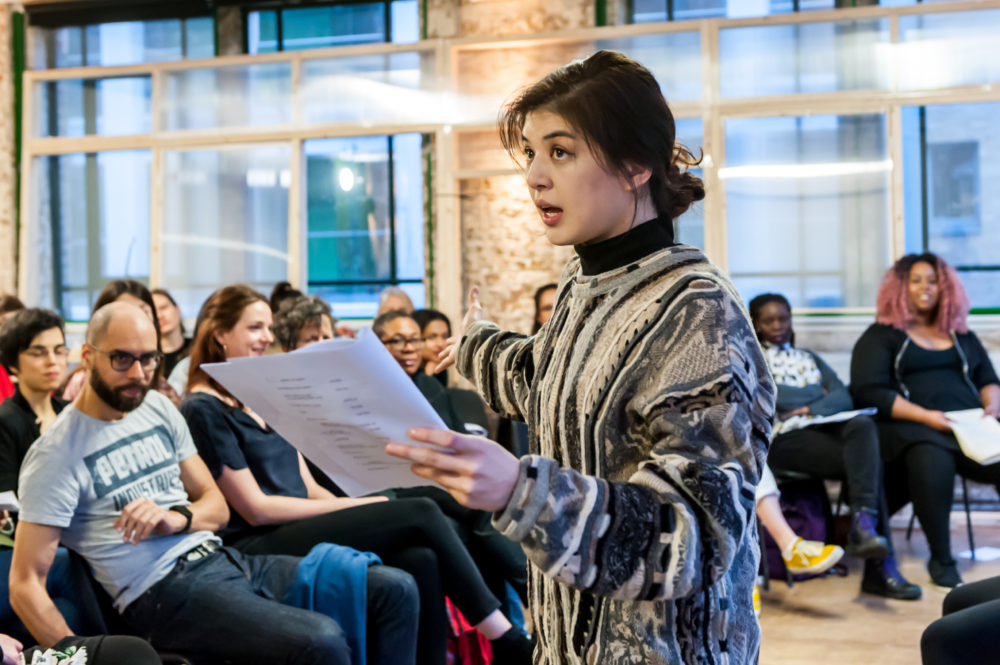
Mia Foo in Endlings by Celine Song, Global Female Voices at the Arcola Theatre, April 11, 2018
It has to be said that for all our metaphysical questions about the programming of this free event, the audiences were very generous with their trust since we had “sold” at 75% of our capacity for the night before announcing the plays selected!
So finally, and less than 10 days before the event, we had our shortlist which included:
- Endlings by Celine Song (South Korea)–a story set on the island of Man-Jae in Korea where three elderly haenyeos–“sea women”–spend their dying days diving into the ocean to harvest seafood with nothing but a rusty knife
- Orchid by Mũmbi Kaigwa (Kenya)–a fascinating verbatim piece telling the stories of fistula (a hole in the wall of the birth canal) survivors from Kenya, that premiered at the Manchester Royal Exchange in 2016
- Emily Of Emerald Hill by Stella Kon (Singapore)–the tale of a matriarch of a distinguished household, played out in the decadent glory days of the Singaporean Peranakan community
- Foreign Gifts by Nina Kossman (Russia)–a piece in which a simple conversation between two sisters over the dinner table creates a cold war in their front room
- Cinderellas Ltd by Zdrava Kamenova, Gergana Dimitrova, and Anette Daubner (Bulgaria) translated by Atanas Igov and Nathan Cooper–a piece in which three princesses from different countries, speaking different languages; are all on a quest for happiness but are forced to take matters into their own hands.
All the plays were assigned a director from Arcola’s Women Company who chose an abstract to read at the event. The reading was cast in house via the AWC and the rest of Arcola’s community companies. All the directors and actors donated their time for this community-led event. We also want to thank the fantastic international female playwrights and translators who generously agreed for their work to be read at Arcola.
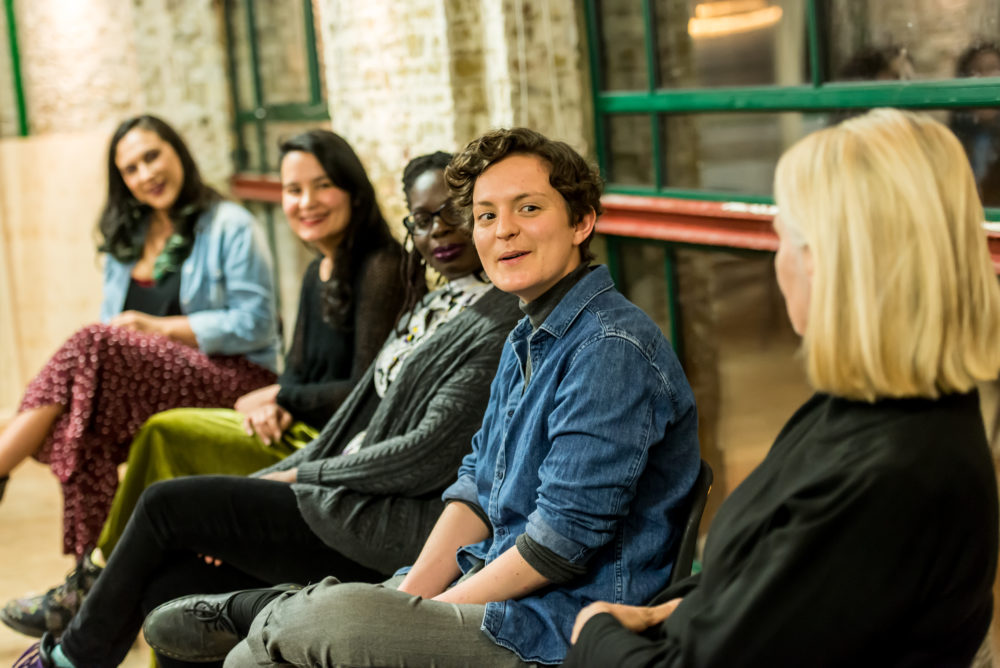
Panel discussion, Global Female Voices, Arcola Theatre April 11, 2018
The event was followed by a discussion with members of the AWC and the team behind the event. We discussed the matter of representation and how important is for that to exist beyond the page–in short: programming diverse, new writers is only one step in the right direction. Representation has to be center stage, quite literally. Two things were further highlighted. First, that events such as Global Queer Plays and Global Female Voices (or any other that showcases work from underrepresented communities) takes a lot of time and effort. And it is because it is not easy that theatres and companies must make the effort. Second, that there is still a lot to do. Be it redressing the gender balance or shining light on under-represented stories or communities. There is probably a third thing to add to this. And it is the fact that there are unsung heroes doing this work. To paraphrase a couple of lines from Smile, Darling: lots of people “taking up space to give up space” for others. It has been an honor to be part of this. And I look forward to developing Global Voices further. Watch this space.
Written by Lora Krasteva and edited by Rach Skyer.
Lora is Development Manager at Arcola Theatre and Assistant Producer for the Creative/Disruption 2018 Festival. She is a member of Arcola’s Women Theatre Company and curated and produced Global Female Voices with Rach Skyer. @LoraKrasteva
Rach Skyer is a freelance Theatre Producer and member of the Arcola Queer Collective. You can follow them on Twitter: @RachSkyer.
This post was written by the author in their personal capacity.The opinions expressed in this article are the author’s own and do not reflect the view of The Theatre Times, their staff or collaborators.
This post was written by Lora Krasteva.
The views expressed here belong to the author and do not necessarily reflect our views and opinions.

